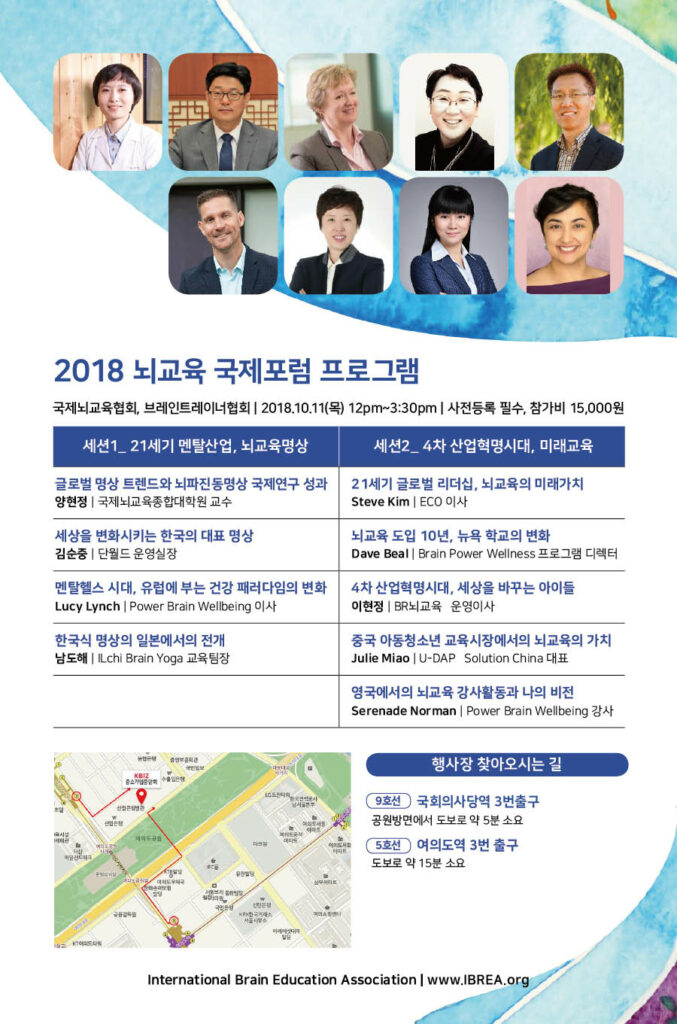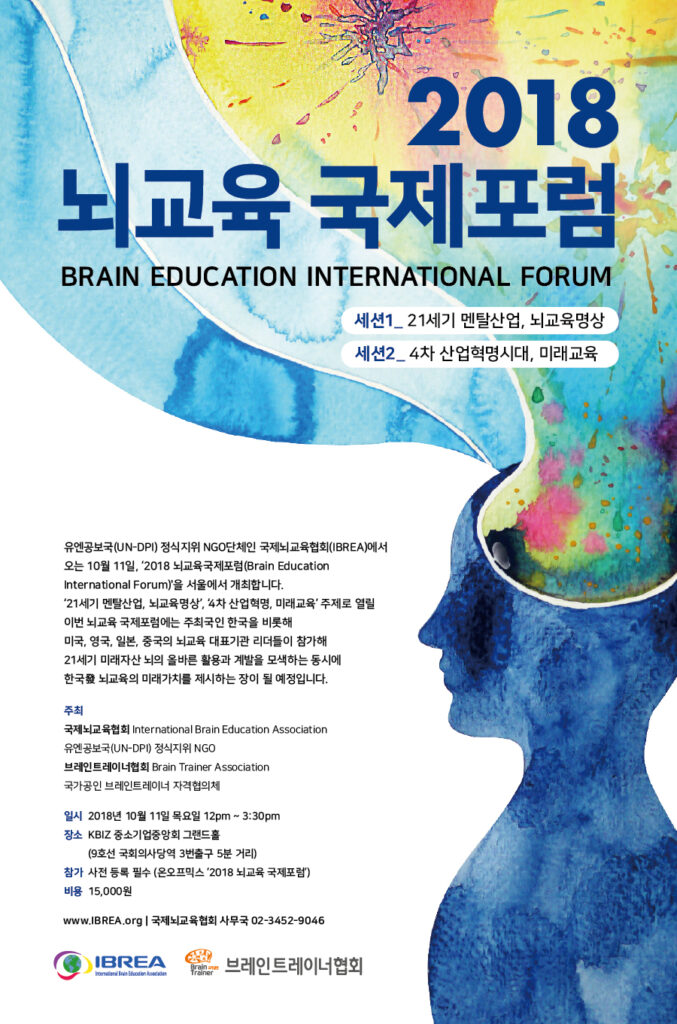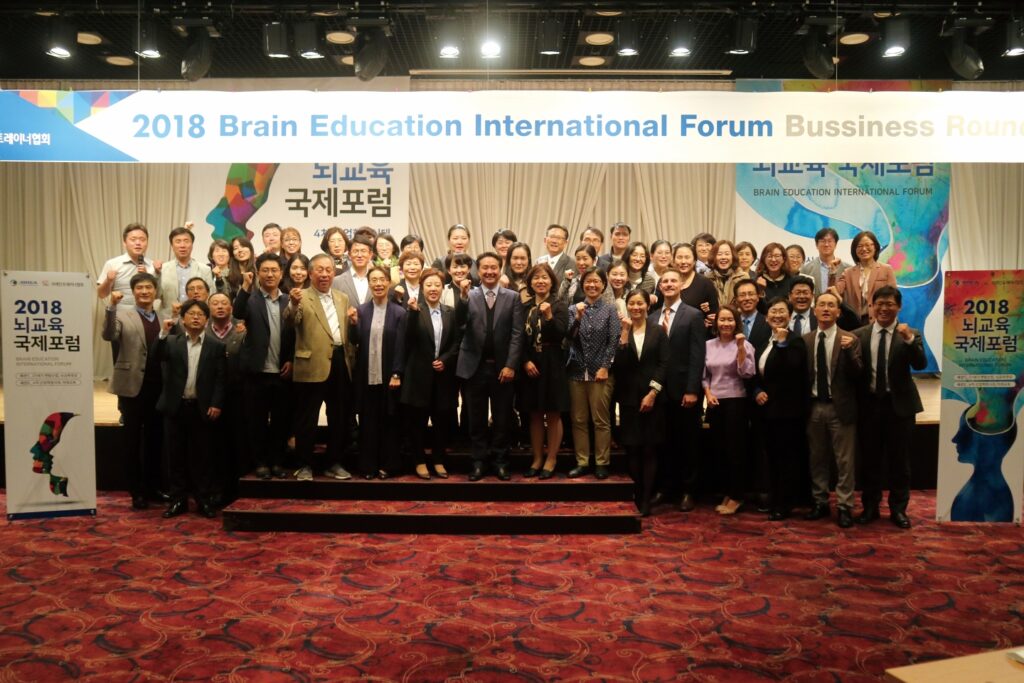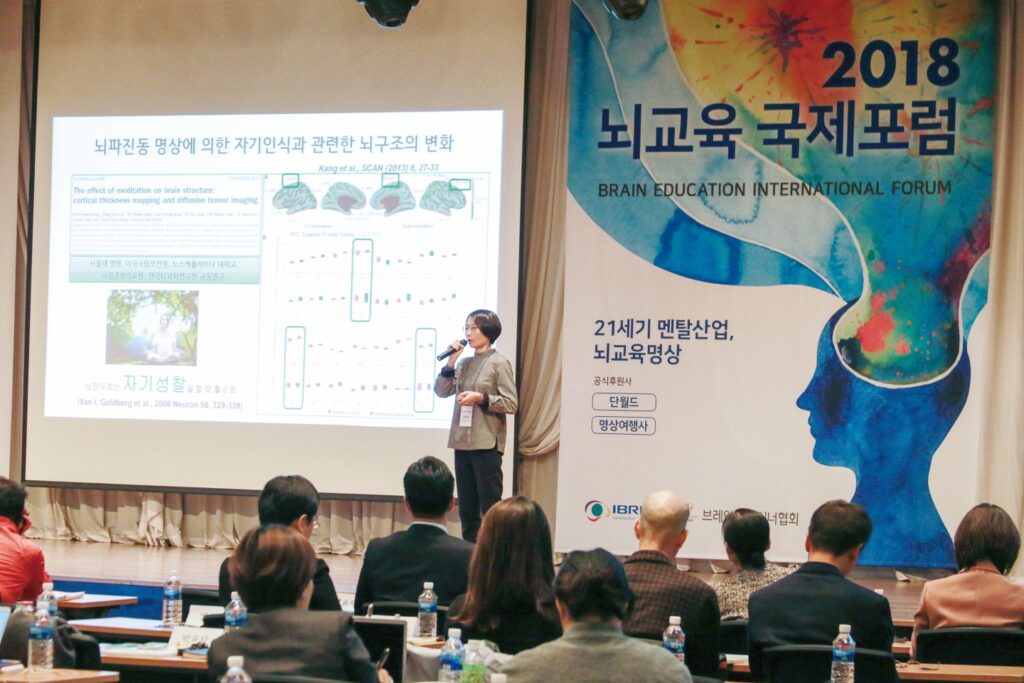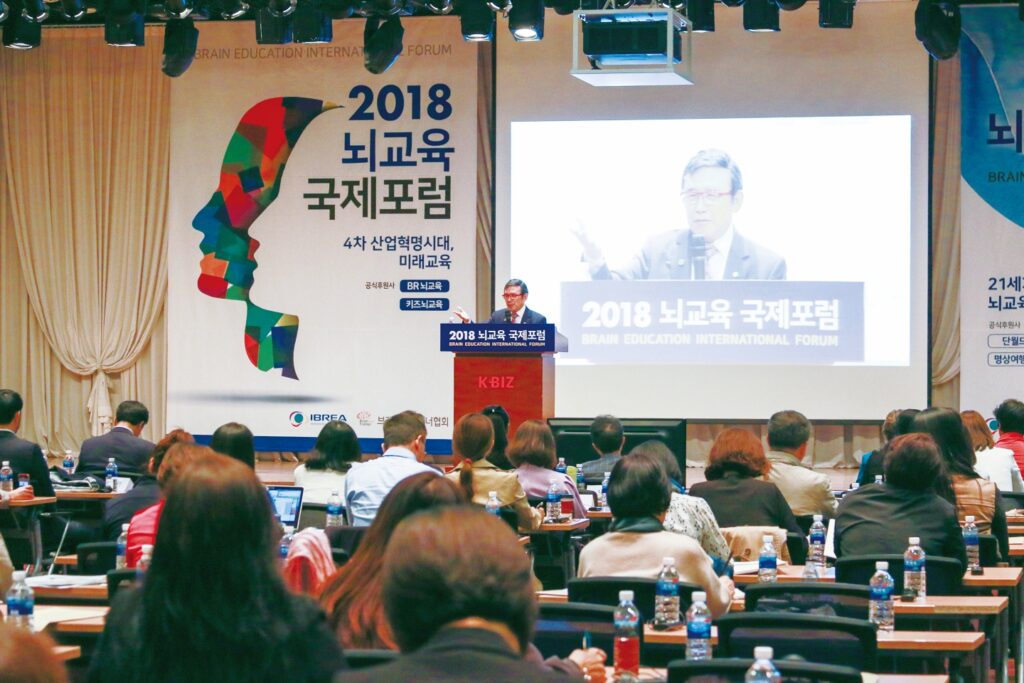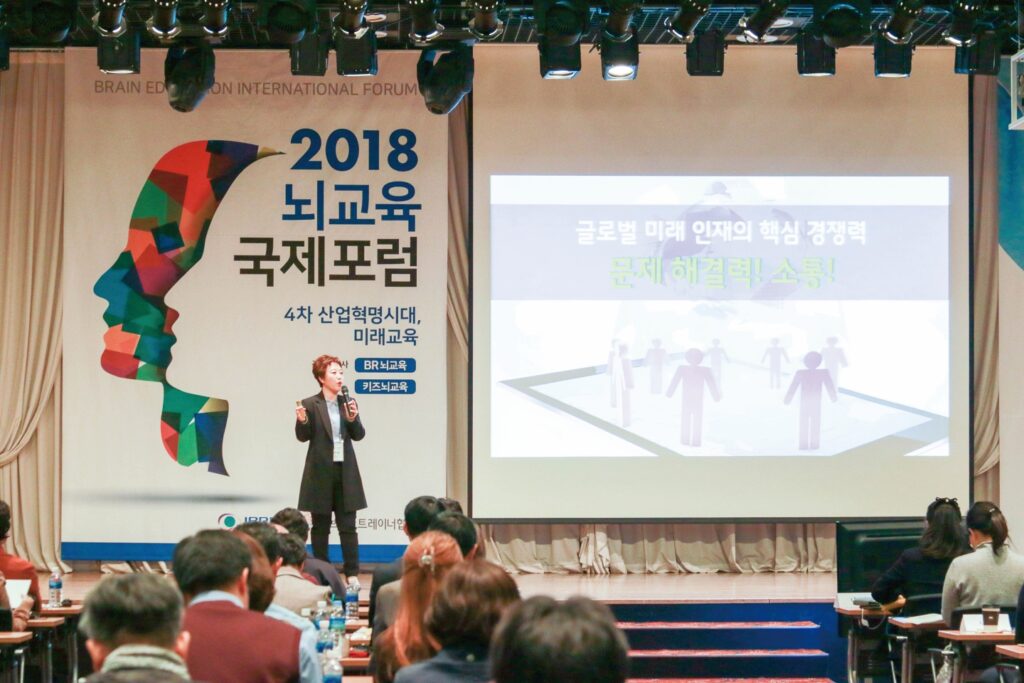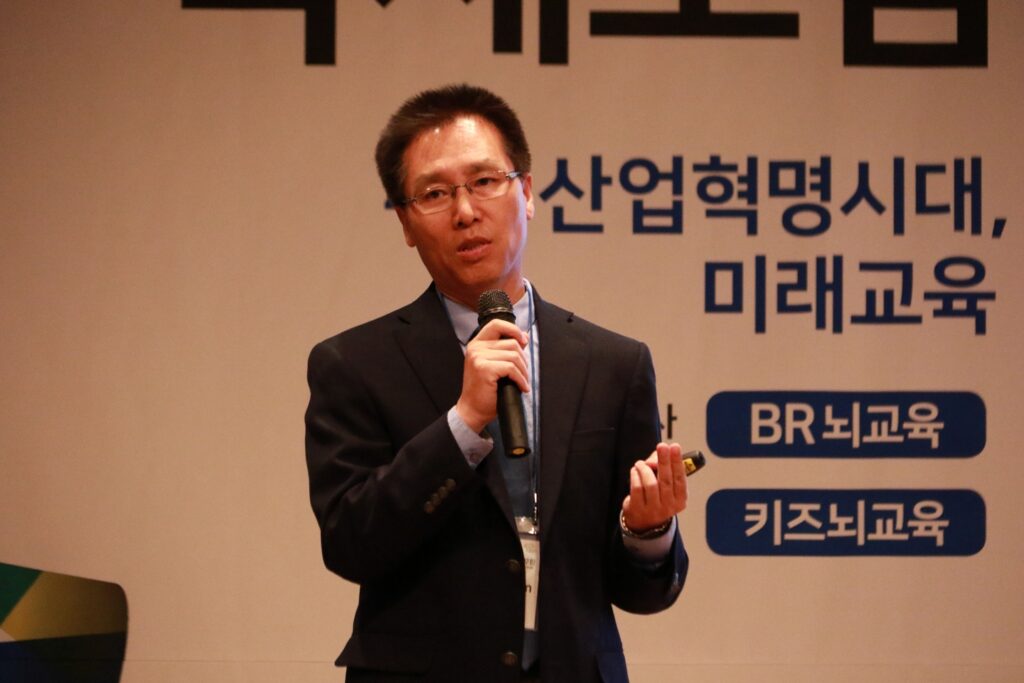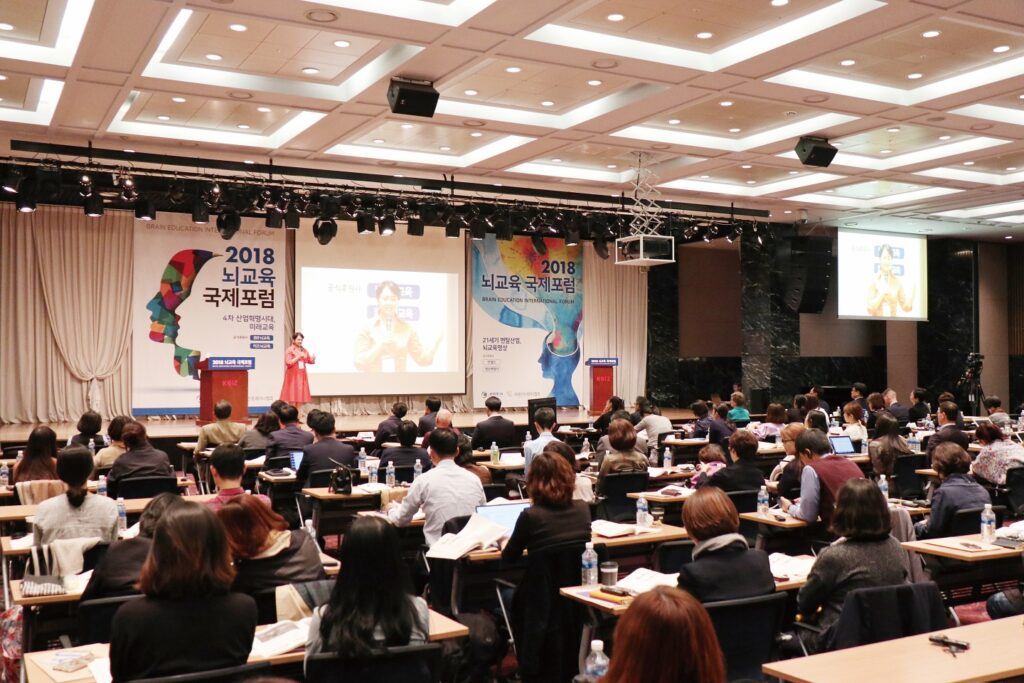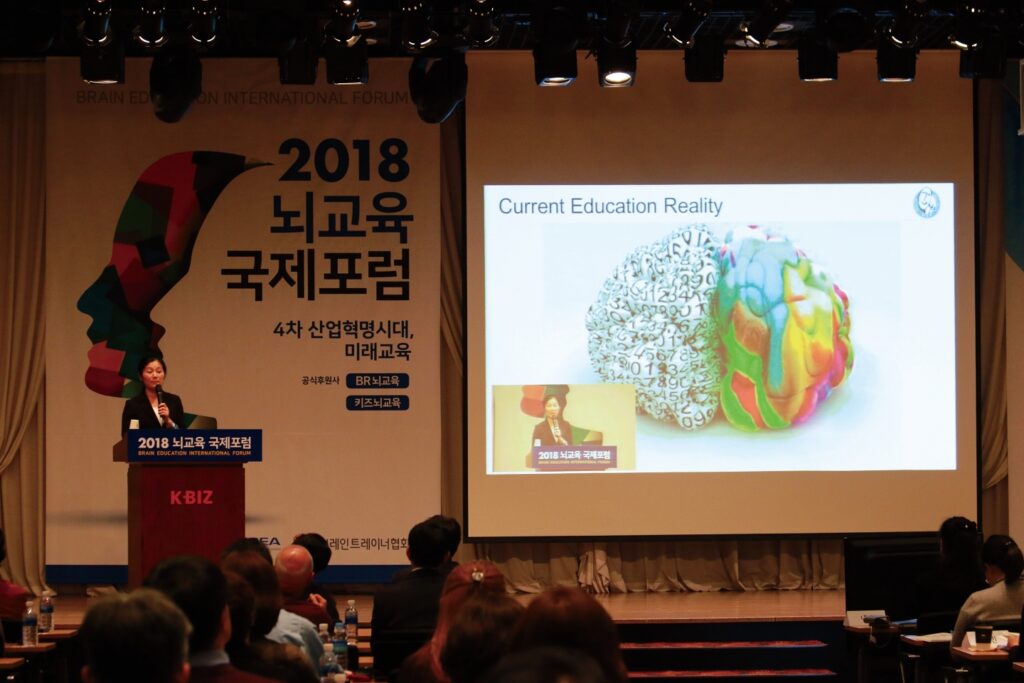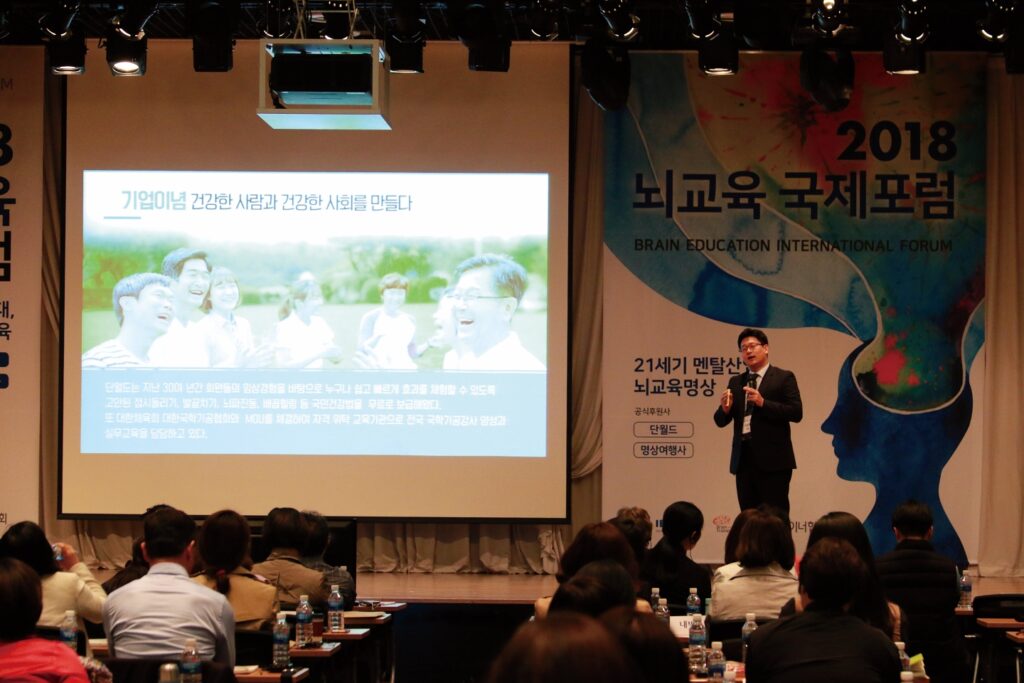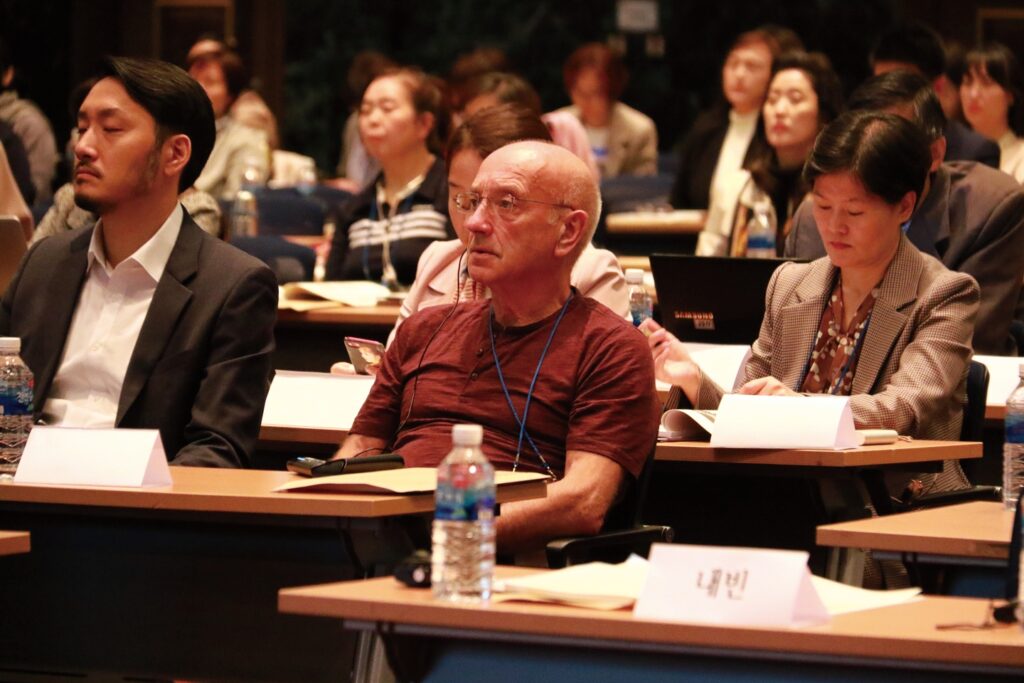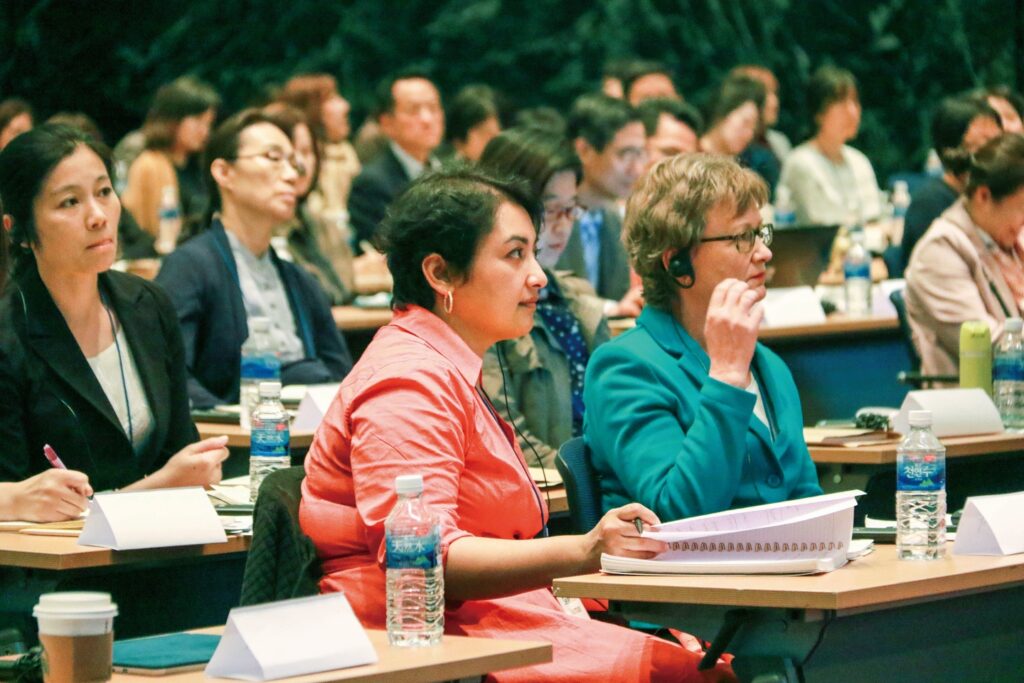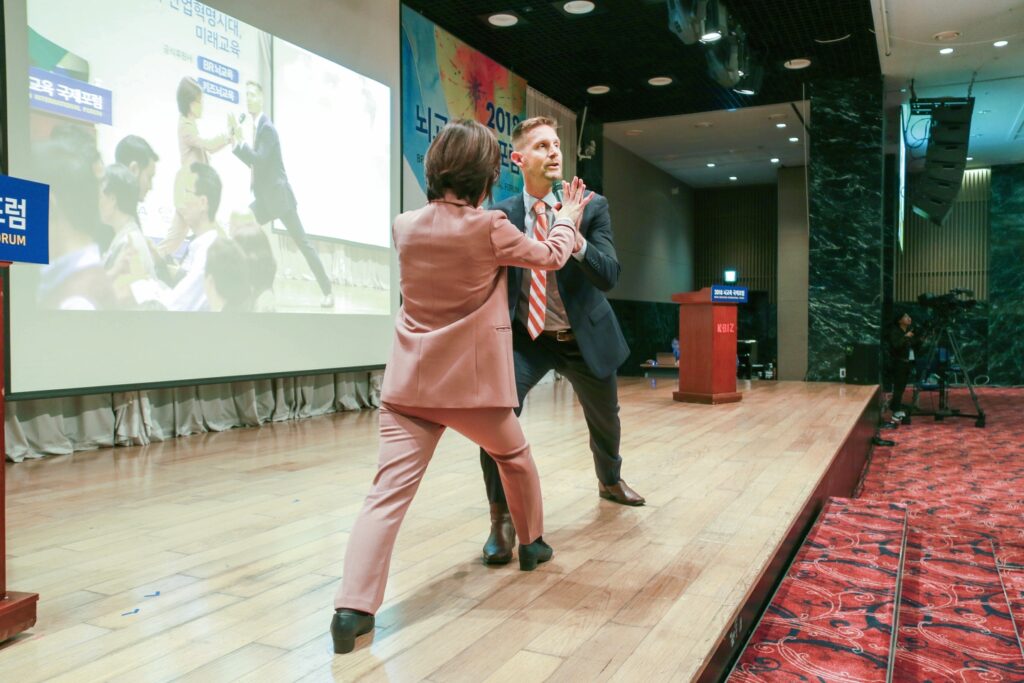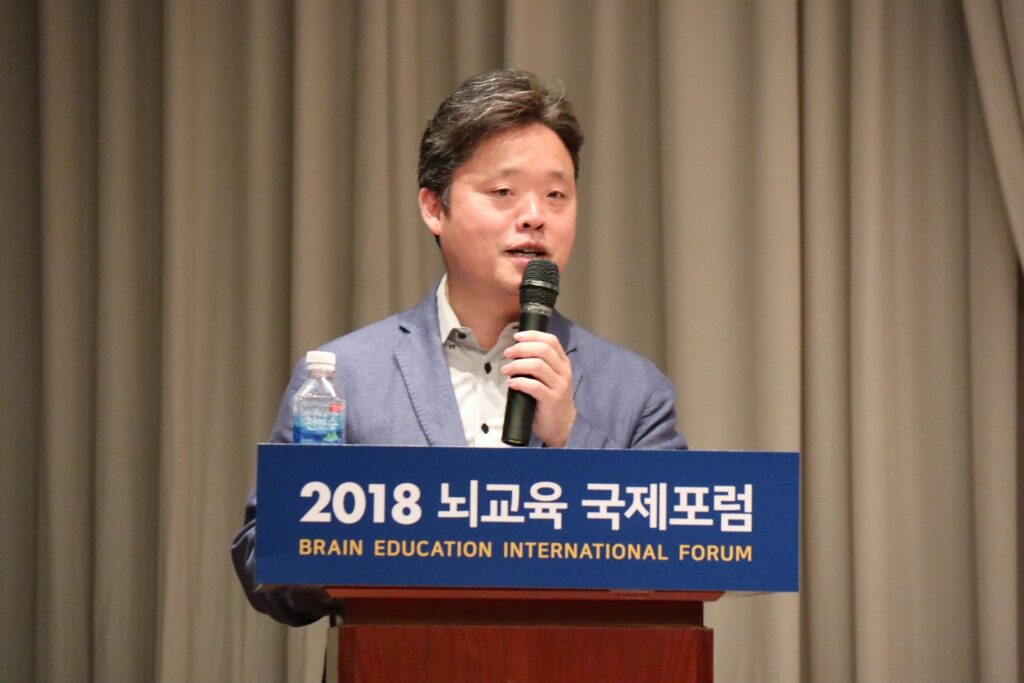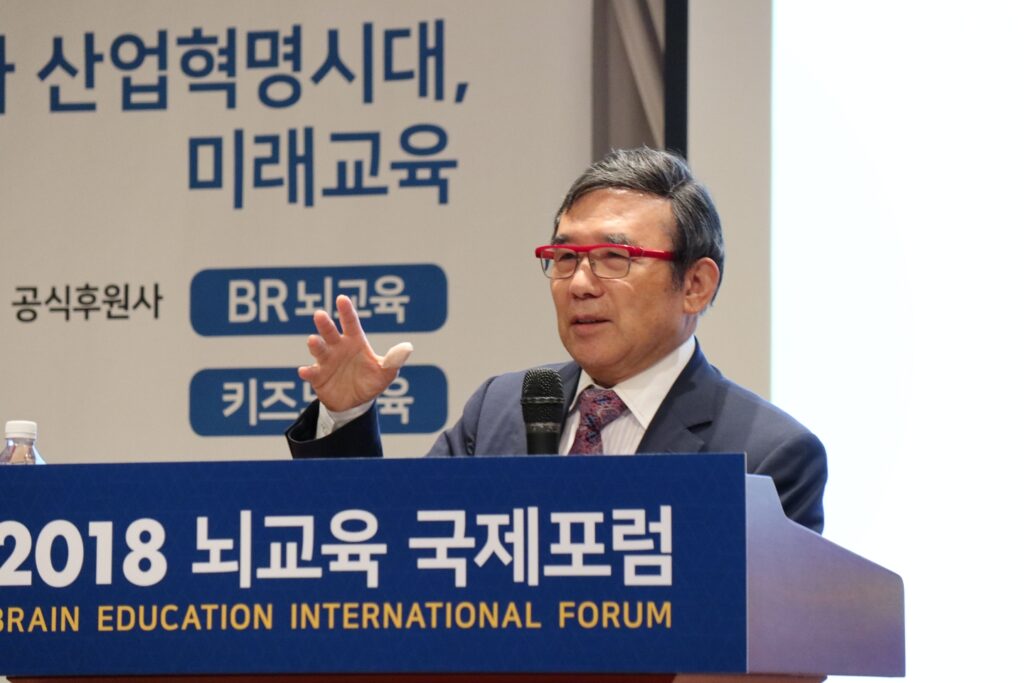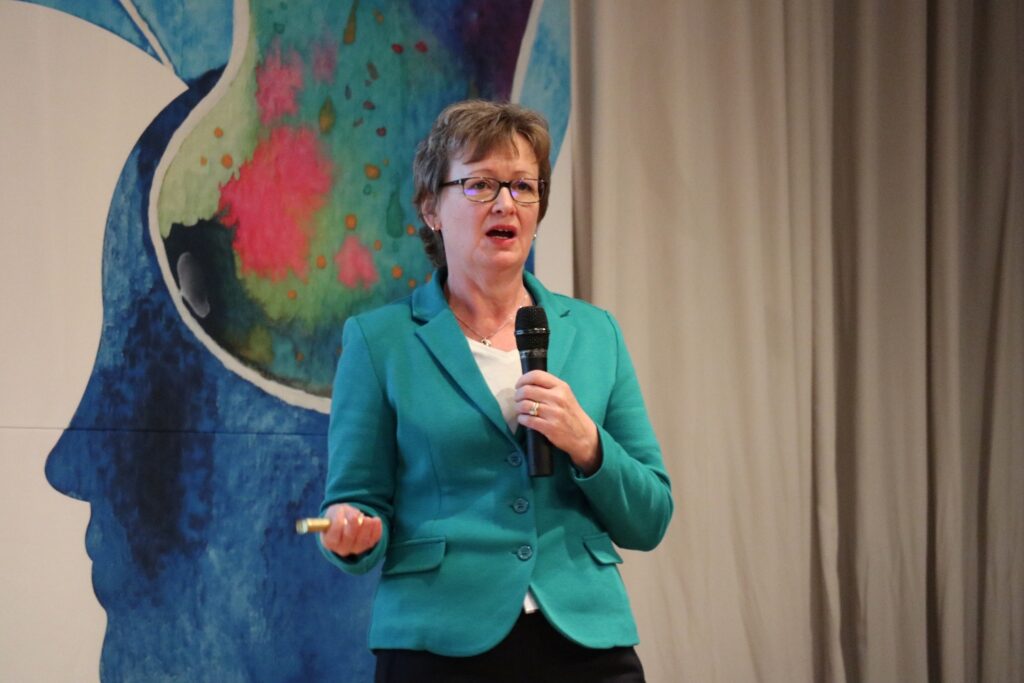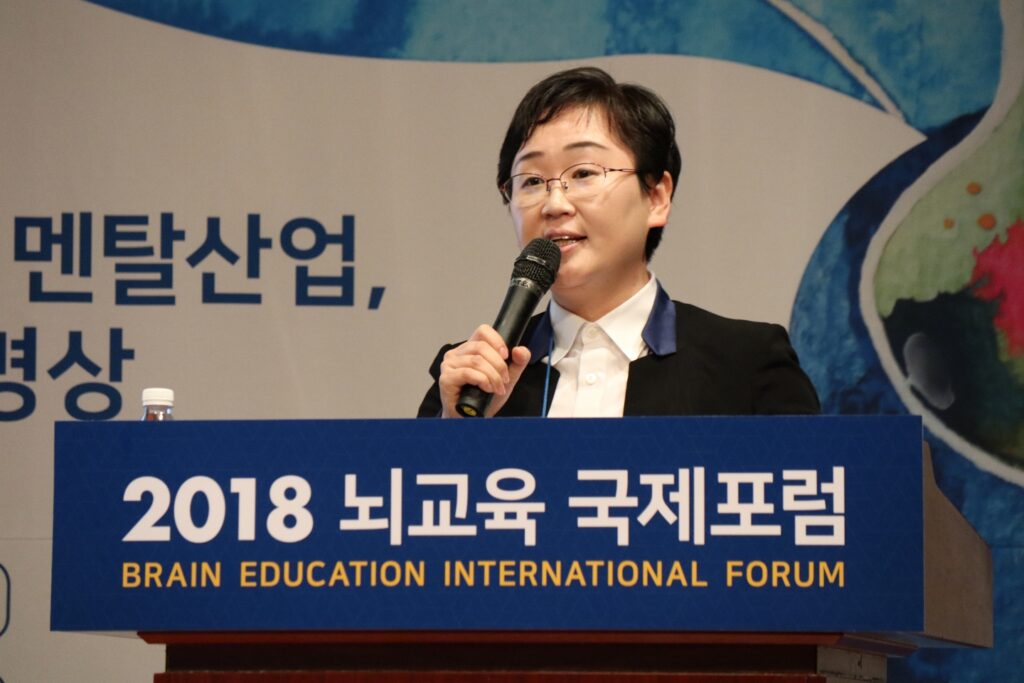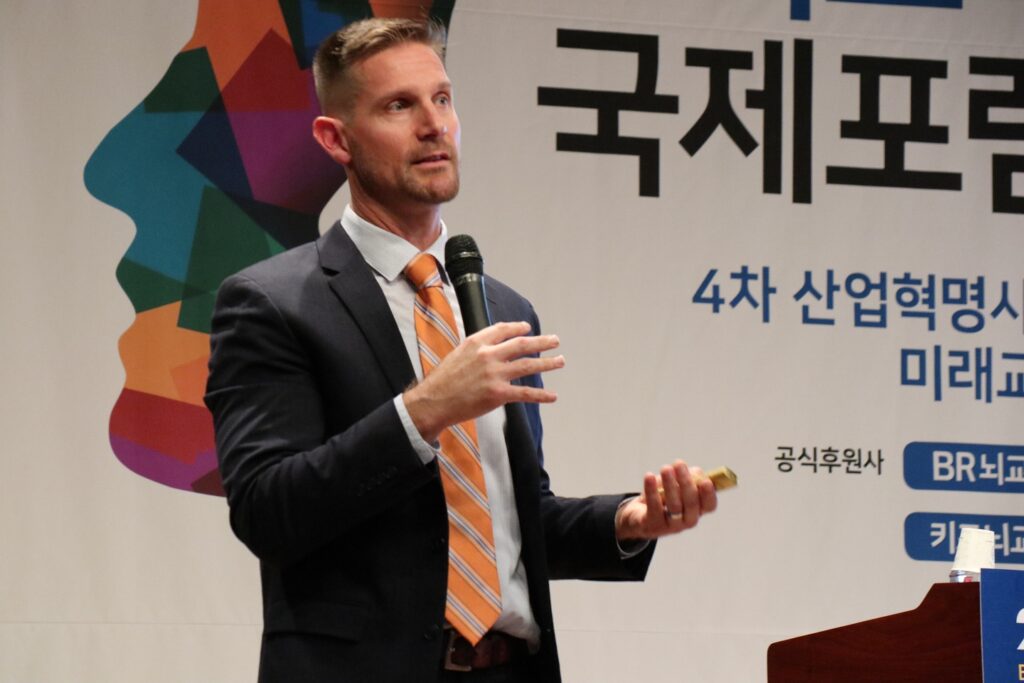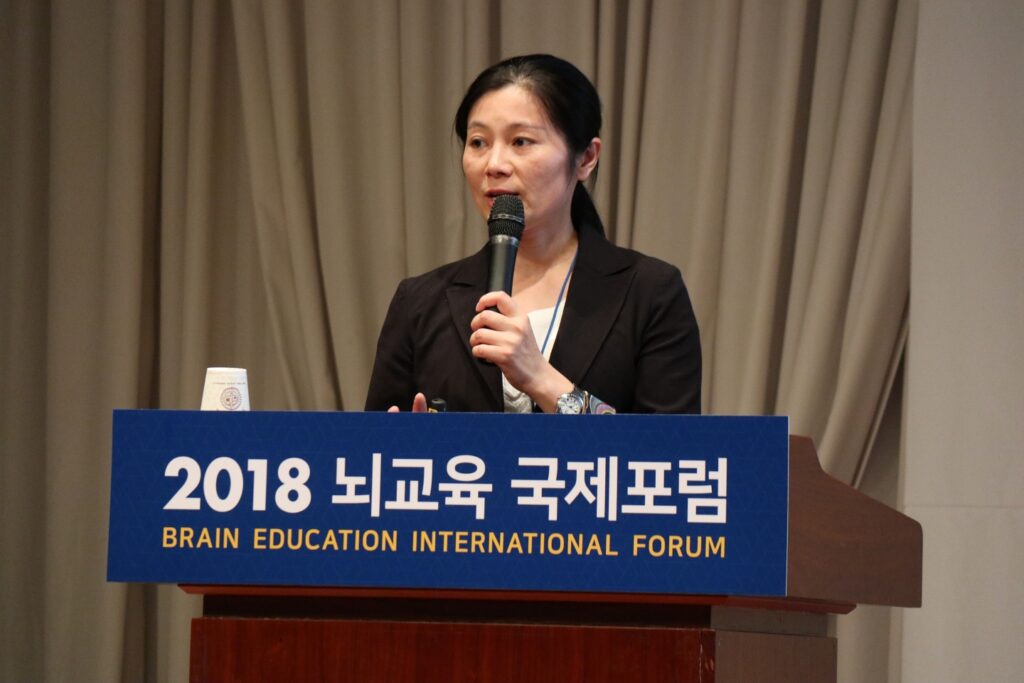The 2018 Brain Education International Forum was designed to deepen the understanding of the potential social value of Brain Education across diverse socio-cultural environments in various countries. The event attracted over 300 participants, including representatives and speakers from Brain Education institutions in the US, the UK, Japan, China, and Korea.
- Theme
- The Mental Health Industry for the 21st Century: Brain Education and Meditation
- The Era of the 4th Industrial Revolution and Future Education
- Date: October 11, 2018
- Venue: Seoul, South Korea
- Host: IBREA, Brain Trainer Association
Program
Opening Speech
- Seil Jeon, President of Brain Trainer Association ▶Watch on YouTube
Session I: The Mental Health Industry for the 21st Century: Brain Education and Meditation
- Global trends of meditation and international research findings on Brain Wave Vibration
– Hyun-Jung Yang, Vice Director of Korea Institute of Brain Science ▶Watch on YouTube - Korean-style meditation changes the world
– Soon-Joong Kim, Operations Manager of Dahn World ▶Watch on YouTube - The era of mental health: A new health paradigm in Europe
– Lucy Lynch, Director of Power Brain Wellbeing ▶Watch on YouTube - Deploying Korean-style meditation in Japan
– Ji-Young Nam, Education Team Leader of ILCHI Brain Yoga ▶Watch on YouTube
Session II: The Era of the 4th Industrial Revolution and Future Education
- Earth Citizenship for a sustainable future of humanity
– Steve Kim, Director of ECO ▶Watch on YouTube - Changing the culture of classrooms for a better world: Application of Brain Education in the public school system
– Dave Beal, Program Director of Brain Power Wellness ▶Watch on YouTube - Children who change the world in the era of the 4th Industrial Revolution
– Hyeon-Jeong Lee, Director of Operations at BR Brain Education ▶Watch on YouTube - The value of Brain Education in China’s education market for children and youth
– Julie Miao, CEO of U-DAP Solution China ▶Watch on YouTube - My Experience as a Brain Education Leader in UK and my vision
– Serenade Norman, Instructor at Power Brain Wellbeing ▶Watch on YouTube
International Trends Highlight the Efficacy of Brain Wave Vibration
Hyun-Jung Yang, Vice President of Korea Institute of Brain Science, shed light on a dozen peer-reviewed studies that extol the benefits of Brain Wave Vibration. Summing up, she explained that the technique uniquely melds both dynamic and static meditation, creating a dual-impact on the mind and body. “Brain Wave Vibration functions in two distinct ways,” she explained. “Through a top-down approach, meditation first influences the brain, subsequently affecting the body. Conversely, the bottom-up method begins with the body, directing its influence upwards to the brain.”
The Global Relevance of Korean-Style Meditation
Soon-Joong Kim, of Dahn World—a leading corporation in Korea’s meditation market—believes that meditation should be accessible, irrespective of one’s physical agility or mental concentration. “Korean meditation offers a solution,” he suggested. Rooted in the ethos of Korea’s Tao training, or Sundo, this form of meditation harnesses easy physical movements that focus on sensing bodily energy. But beyond technique, he emphasized its grounding in the age-old Korean philosophy of Hongik Ingan, which champions benefiting humanity at large.
“At Dahn World, people first seek us out for health and healing. But as they rejuvenate, their goals evolve—they aspire to share meditation training methods that they learned,” he explained. This, according to Kim, is what truly distinguishes Korean-style meditation on the global stage.
Further highlighting its outreach, Dahn World operates over 230 centers across Korea, boasting more than 3,000 members and employees. Their commitment to community is palpable, with initiatives like free meditation classes in parks and community centers for seniors.
Mental Health in Europe: A Paradigm Shift
Lucy Lynch, from the UK’s Power Brain Wellbeing, underscored the transformative power of meditation. “Our clients often come seeking solace from stress and health concerns. But through their journey, they discover the symbiotic relationship between their body and mind,” she noted. Embracing the principles of Brain Education, many find renewed confidence and a zest to give back to their communities.
The Simplicity of Korean-Style Meditation Resonates in Japan
In a nation with a rich meditation history, Ji-Young Nam observed a growing appreciation for the simplicity of Korean-style meditation. “Japanese Zen, while profound, involves intricate steps. In contrast, the ease and effectiveness of our technique has left many in Japan amazed,” she remarked. Nam remains optimistic about its integration within Japan’s mental health policies, particularly as ILCHI Brain Yoga takes pivotal steps within the Ministry of Health’s Smart Life Project.
Brain Education: Steering Earth Citizenship in the 21st Century
Steve Kim, the Director of the U.S.-based Earth Citizen Organization, showcased a three-minute YouTube clip that captured a poignant moment: the extraction of a plastic straw lodged in a turtle’s nostril. “While most of us acknowledge the need to curtail our plastic consumption for the sake of our planet,” Kim noted, “it was this brief footage that galvanized a global call to arms.”
Kim posed a pertinent question to his audience: “There’s ample talk about envisioning a sustainable future, but who, in the face of geopolitical and corporate interests, genuinely prioritizes our environment?” He elaborated, “Reversing the environmental tide isn’t merely about policymaking and disseminating knowledge. It hinges on rekindling a sense of empathy—a fundamental trait of our human brain—that empowers individuals to effect positive change, not only globally but also in their personal spheres.”
According to Kim, Brain Education serves as a conduit to rejuvenate this latent empathy, recalibrate the values individuals uphold, and pave the way for a sustainable, healthful, and joyous world. And this vision, he asserts, lies at the heart of the Earth Citizens Movement.
Brain Education’s Impressive Decade in New York’s Schools
Dave Beal, of Brain Power Wellness, noted the rising prominence of mindfulness in US educational discourse. Presenting comparative data, he shared, “While both Brainpower 10 and other mindfulness programs have had positive impacts, Brain Education showed a remarkable 52% improvement in behavioral issues.” He credits this success to the program’s holistic approach, which fosters empathy and self-awareness among students.
Through Brain Education programs, students gain deeper insights into their inner selves and foster stronger empathy towards their peers, leading to a marked increase in positive behavioral shifts, he elaborated.
Shaping Tomorrow’s Leaders in the Age of the 4th Industrial Revolution
Hyun-Jeong Lee, from Korea’s premier youth Brain Education institution, BR Brain Education Co. Ltd., emphasized the pivotal role of Brain Education in shaping the future. She underscored the importance of strengthening the self-esteem and confidence of young individuals to steer the digital revolution towards enhancing human values.
“Our Brain Education programs incorporate brain exercises and meditation to rejuvenate the body and elevate cognitive awareness. This empowers individuals to discern information accurately and engage in creative endeavors, maintaining mastery over their minds.”
China’s Evolving Educational Landscape and the Role of Brain Education
Julie Miao, at the helm of U-DAP Solution China, provided insights into China’s educational paradigm and its shifts. Drawing parallels between China and Korea’s educational pressures, she highlighted China’s evolving educational vision, citing President Xi Jinping’s 2018 proclamation on fostering holistic education. With two centers in Shanghai, U-DAP’s Brain Education programs have been heralded for fostering traits like patience, self-control, and improved parent-child communication.


